Economic commentary provided by Alberta Central Chief Economist Charles St-Arnaud.
Bottom Line
Inflation continued to accelerate in June to a level not seen since 1983 but increased less than expected thanks to a stabilization in food price inflation. The elevated level of inflation continues to be mainly due to a handful of components: gasoline prices, food prices, homeowners’ costs, utilities costs and motor vehicle prices. Altogether, these five items are responsible for about 6.1 percentage points of the 8.1% inflation rate. Nevertheless, inflationary pressures are broad, with about 75% of the components of CPI rising at more than 3% y-o-y and more than half at 5% y-o-y (see Fig 1) and various core measures of CPI accelerating and reaching record levels.
Additionally, the recent trend in the CPI monthly changes suggests that inflationary pressures remain elevated. As such, the 3-month annualized change in most of the CPI components remains well above 3% and above their year-on-year changes, suggesting a continued acceleration in price increases (see Fig. 2).
The recent stabilization in food price inflation, while remaining high, is a positive and will be welcomed by consumers. However, with the downside risks to the European food supply coming from the war in Ukraine and the current severe heatwave, it may prove short-lived. The reduction in gasoline prices so far in July will likely lead a deceleration of inflation next month.
With inflation well above its target of 2% and more persistent than initially thought, inflation expectations rising and broad inflationary pressures, we believe the Bank of Canada will continue to hike interest rates aggressively. In our view, the BoC will likely increase its policy rate by 50bp at the September and October meetings, ending the year at 3.50%. The case for supersized rate hikes (75bp or 100bp) remains if inflation is to surprise on the upside in the coming months.
In Alberta, inflation accelerated to 8.4%, higher than the national measure. As is the case nationally, most of the inflation is due to higher energy costs, homeownership costs, motor vehicles and food prices. We note that natural gas and electricity prices have increased by 55% and 36%, respectively, over the past year, much more than in the rest of the country and are responsible for the higher inflation rate in the province compared to the Canadian measure.
The Consumer Price Index (CPI) increased by 0.7% m-o-m non-seasonally-adjusted in June, weaker than expected. The inflation rate accelerated to 8.1%, its highest level since January 1983. Prices rose on the month in all of the major CPI components, except in clothing and footweaker (-1.3%). The biggest increases were in transportation (+2.3% m-o-m), education, recreation and reading (+1.1% m-o-m), and shelter (+0.4% m-o-m). Most of the increase in transportation costs can be traced back to a 6.2% m-o-m increase in gasoline prices. The increase in transportation (+0.4pp), shelter (+0.1pp), and recreation, education and reading (+0.1pp) were the main contributors to the monthly increase in CPI.
Seven of the eight major CPI components either accelerated or rose at the same pace in June on a year-on-year basis, led by transportation costs, food prices, and shelter costs. Transportation costs were accelerated to 16.8% y-o-y, contributing 2.8pp to inflation, with gasoline prices being the main source of cost increases in the category (+54.6% y-o-y contributing 2.3pp). Food prices inflation stabilized at 8.8%, its highest since 1982, and contributed 1.4pp to inflation. Shelter costs decelerated to 7.1% y-o-y, as rented and owned accommodation costs inflaton eased somewhat.
In May, goods prices inflation accelerated to 11.2% from 10.4% and services inflation was unchanged at 5.2%. Energy prices also accelerated, increasing by 39.8% since June last year. Excluding food and energy, prices rose 0.4% on the month and increased by 5.3% compared to the same month the previous year, the fastest since 1991. The Bank of Canada’s old measure of core inflation, CPI excluding the 8 most volatile components and indirect taxes, edged higher to its highest level since records started in 1984 at 6.2%.
Looking at the BoC’s core measures of inflation, CPI-Trim rose to 5.5 % from 5.4%, its highest on record, and CPI-Common to 4.6% from 4.5%. CPI-Median was unchanged at 4.9%, its highest on record. The average of the core measures increased to 5.0% from 4.9%, its highest on record.
In Alberta, inflation jumped to 8.4% in June, from 7.1%. Transportation costs were the main reason for the acceleration in inflation in June, as gasoline prices rose 13.5% m-o-m, and contributed 3.0pp to inflation. Shelter costs are another important contributor to inflation (contributing +2.2pp), mainly due to rising utilities costs, especially electricity and natural gas prices. As such, natural gas prices have jumped 54.6% compared to June last year and electricity by 30.9% over the same period. Food prices are also an important source of inflation, contributing +1.2pp. Goods price inflation rose to 12.1% and services price inflation increased to 4.7%. Inflation excluding food and energy accelerated to 5.2%, while energy costs jumped by 46.5% compared to the same month last year.
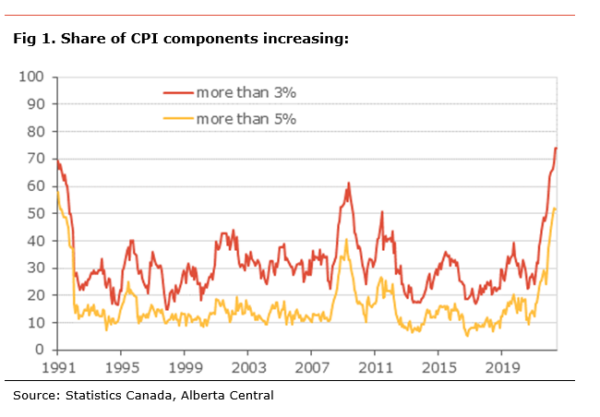
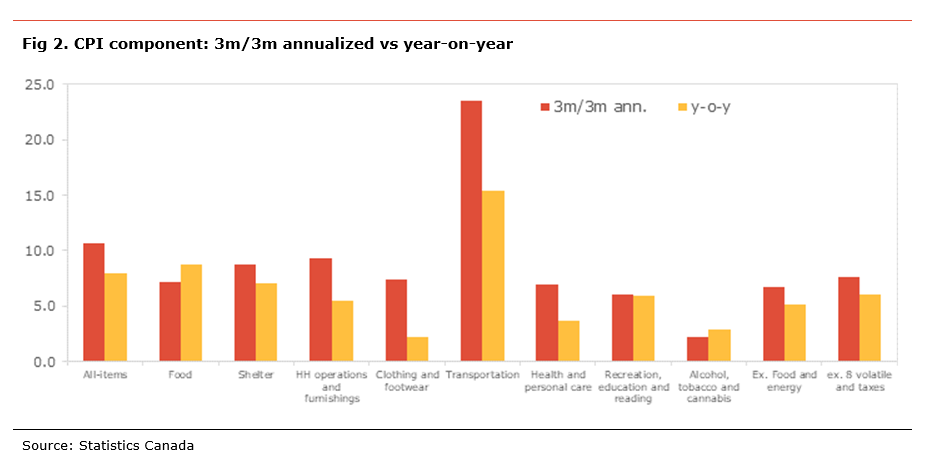
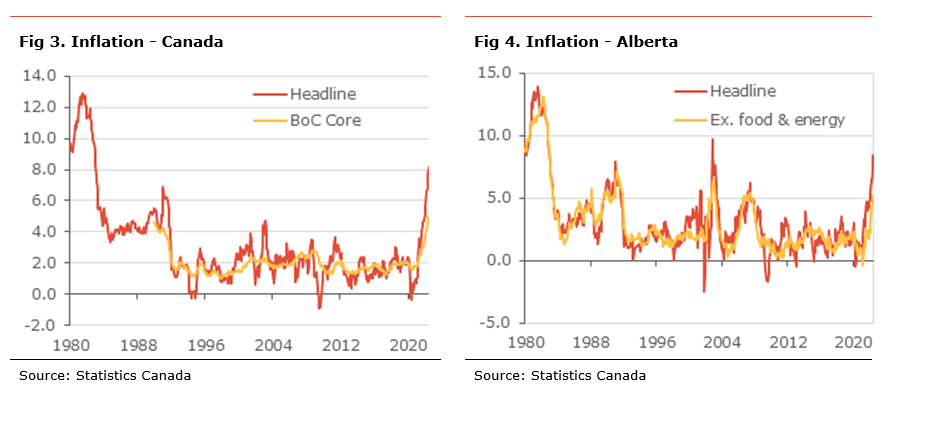
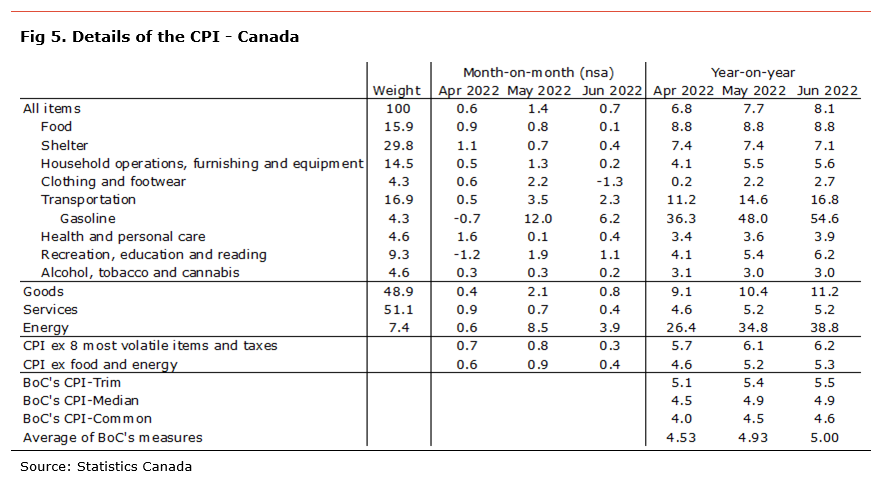
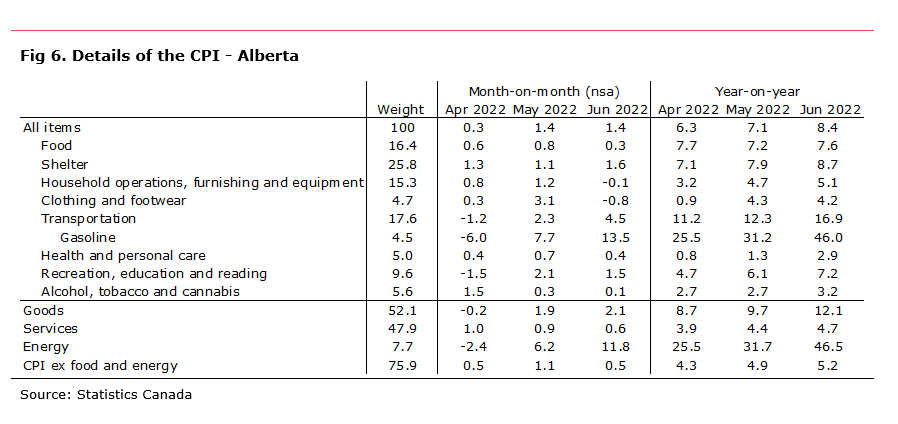
Independent Opinion
The views and opinions expressed in this publication are solely and independently those of the author and do not necessarily reflect the views and opinions of any organization or person in any way affiliated with the author including, without limitation, any current or past employers of the author. While reasonable effort was taken to ensure the information and analysis in this publication is accurate, it has been prepared solely for general informational purposes. There are no warranties or representations being provided with respect to the accuracy and completeness of the content in this publication. Nothing in this publication should be construed as providing professional advice on the matters discussed. The author does not assume any liability arising from any form of reliance on this publication.